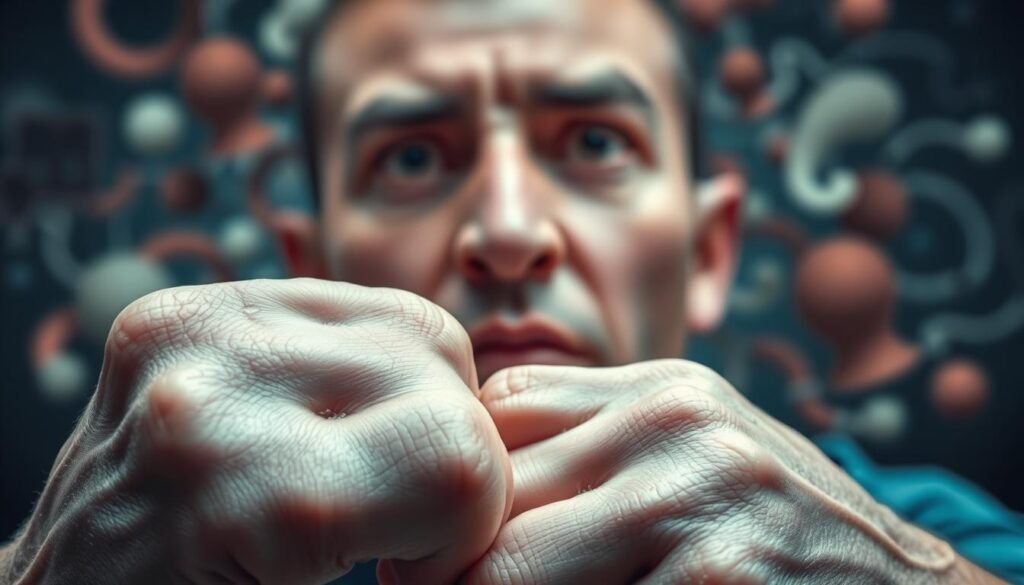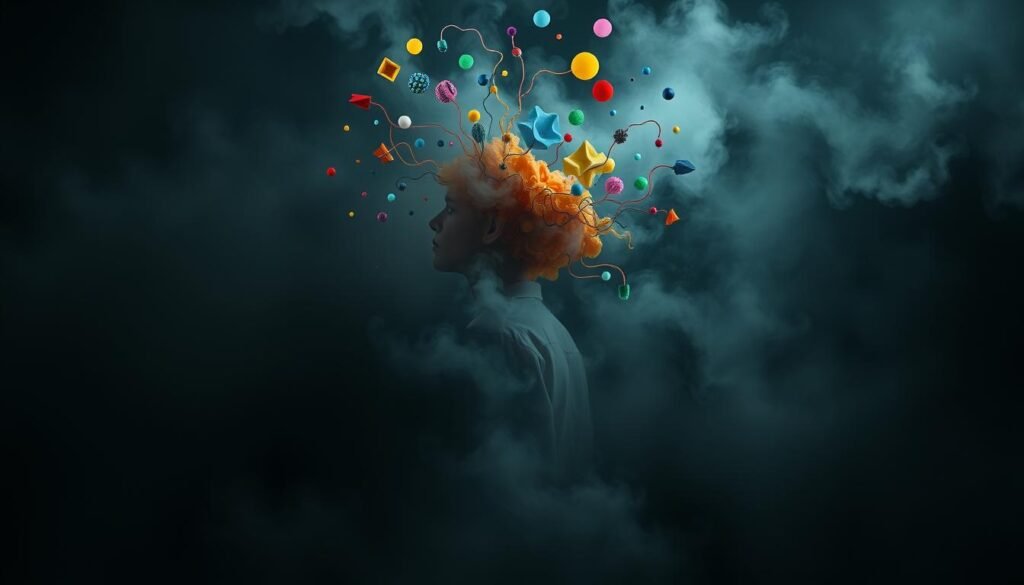About 31.1% of U.S. adults will face an anxiety disorder at some point. This fact shows how common anxiety is, even without clear reasons for it. People often ask, “why do I have anxiety for no reason?” Getting to know unexplained anxiety is key, as it can really impact your day-to-day life and happiness. Signs like constant worry and panic are crucial to spot and tackle.
Unexplained anxiety comes from many sources. Recognizing these can help manage it better. The Mayo Clinic and the National Institute of Mental Health (NIMH) say understanding and treatment can improve life a lot. With the right help and knowledge, dealing with unexplained anxiety gets easier.
Key Takeaways
- Approximately 31.1% of adults in the U.S. experience anxiety disorders.
- Unexplained anxiety can disrupt daily activities and well-being.
- Effective treatment options exist for managing unexplained anxiety.
- Understanding the causes of anxiety is crucial for recovery.
- Raising awareness about anxiety can lead to better support and interventions.
Understanding Unexplained Anxiety
Unexplained anxiety is confusing, filled with intense worry for no clear reason. People often wonder why do I have anxiety for no reason. They try to figure out if what they’re feeling is just stress or something more. The symptoms of anxiety disorders include a lot of worry, stiff muscles, feeling irritable, and having trouble with daily tasks.
About 3.1% of the U.S. population each year is affected by generalized anxiety disorder (GAD). That’s roughly 6.8 million adults. More women than men tend to have GAD, with rates almost double. This disorder usually starts in the teen years or early adulthood. It’s important to get help early to stay on track in life.
Those with sudden anxiety might notice a fast heartbeat, difficult breathing, and trouble sleeping. Knowing about these random anxiety attacks helps people manage them better. Figuring out what triggers them and learning coping skills, like therapy or mindfulness, can help a lot.
Being aware of anxiety disorders, including panic disorder, is key for getting help quickly. Many with GAD also have mood or depressive disorders. Addressing these problems early and knowing the signs can make life better.
The Physical Symptoms of Anxiety
Anxiety can show itself in many physical symptoms of anxiety. These can deeply affect your daily life. Signs include a fast heart rate and quick breathing. Symptoms might pop up in stressful times or out of the blue. This can start a cycle of fear, where the symptoms make the anxiety worse.
Other effects of anxiety are shaking, sweating, and tense muscles. Stomach problems like nausea and diarrhea can also happen. This shows how our minds and bodies are linked. Many adults feel these symptoms strongly and might avoid places or situations because of them.
Panic attacks are another way anxiety can show up physically. You might feel dizzy, have chest pain, or feel out of control. People feel these symptoms differently. It can make doing daily things hard. Knowing about the physical symptoms of anxiety is key if you’re trying to understand what you’re going through.

| Physical Symptoms | Description |
|---|---|
| Increased Heart Rate | Heightened heart rhythm often felt during anxiety episodes. |
| Rapid Breathing | Quickened breathing that can lead to hyperventilation. |
| Trembling | Uncontrollable shaking that can occur in stressful moments. |
| Gastrointestinal Issues | Problems like nausea or diarrhea linked to anxiety experiences. |
| Panic Attacks | Episodes characterized by intense fear and physical symptoms like chest pain. |
| Dizziness | A sensation of lightheadedness often reported during panic attacks. |
| Chest Pain | Discomfort in the chest region that can be mistaken for heart issues. |
Long-term stress and anxiety can lead to big health issues. This includes high blood pressure, heart problems, and more hospital visits for lung issues. Knowing this can help you find ways to handle your anxiety better.
Why Do I Have Anxiety for No Reason?
Many people feel anxious without knowing why. They ask themselves, “why do I have anxiety for no reason?” It’s puzzling because anxiety often comes from clear worries. Still, it can happen without any obvious cause due to many factors.
Exploring Common Triggers
Hidden triggers of anxiety are more common than some believe. These triggers vary widely:
- Relationship struggles
- Work-related stress
- Significant life transitions
- Long-term illness or health concerns
Even small changes like sleep issues or diet can lead to anxiety. Knowing these triggers helps people see their anxiety patterns.
Genetic and Biological Considerations
Genetics play a big part in anxiety. If anxiety runs in the family, there’s a higher chance of having it. Studies show that having relatives with anxiety issues means a bigger risk for you.
Your biology can affect your anxiety, too. Imbalances of certain brain chemicals, like serotonin and dopamine, can make anxiety worse. So, individuals may struggle with anxiety due to these internal factors, making their experience more complex.

Causes of Unexplained Anxiety
Understanding the causes of unexplained anxiety is key for handling this tough condition. Many things lead to anxiety disorders. Traumatic events and constant stress are big factors, causing ongoing worry and more anxiety. It’s important to look into these causes to find good ways to cope and get help.
Impact of Life Events and Trauma
Trauma and anxiety are closely linked, making a hard cycle for those dealing with it. Big life changes, like losing someone or going through a hard time, can make a person more likely to get anxiety disorders. Many people who had tough times as kids are much more likely to face anxiety later. Negative events can push the risk of anxiety up by 40%.
Underlying Medical Conditions
Some medical issues can bring on anxiety symptoms too. Conditions like thyroid problems or heart disease might make someone feel anxious, which makes figuring out and treating the problem harder. Knowing about these health issues is a big step in tackling causes of unexplained anxiety right. Getting a full check-up helps understand how body and mind health work together, aiming for a better treatment plan.

| Causes and Triggers | Description |
|---|---|
| Traumatic Life Events | Going through big stresses, like loss or abuse, can cause long-lasting anxiety. |
| Chronic Stress | Being under stress for a long time (work, family, money) ups anxiety. |
| Medical Conditions | Health problems, especially with the thyroid or heart, can show as anxiety. |
| Negative Thinking Patterns | Negative thoughts can make anxiety worse. |
| Caffeine and Medications | Stimulants or stopping anxiety meds can trigger anxiety. |
Focusing on these factors can make us more aware of our mental health and guide us to better treatments. Understanding how trauma, health issues, and daily stresses connect is key to creating personal help plans. Looking into triggers and getting help from professionals leads to better anxiety management.
Dealing with Unprovoked Anxiety
Dealing with unprovoked anxiety is tough, but there are ways to help. Using mindfulness and controlled breathing is key. These methods help you stay in the moment and calm down during anxiety spikes.
Slowly facing what scares you can also help. It allows you to deal with your fears bit by bit. This, along with healthy habits, can lessen your anxiety. Things like exercising, eating well, and sleeping enough are all part of taking care of yourself.
If you’re looking for ways to handle sudden anxiety, try making a daily plan. Include things like muscle relaxation or meditation. Doing things you enjoy and being with friends who support you can also make a big difference.
It’s also vital to understand how your body reacts to anxiety. Sometimes, people get scared by how their body feels, which can lead to panic attacks. Learning about these reactions from resources like detailed insights on panic attacks vs. anxiety is useful. It helps you know what you’re going through.
| Coping Strategy | Description |
|---|---|
| Mindfulness | Being present in the moment to reduce anxiety. |
| Controlled Breathing | Focusing on slow, deep breaths to calm the mind. |
| Gradual Exposure | Facing fears in small increments. |
| Healthy Lifestyle | Maintaining a balanced diet and regular exercise. |
| Self-Care Practices | Engaging in relaxation techniques regularly. |
Coping with Sudden Anxiety Attacks
Sudden anxiety attacks can really shake you up. Knowing how to handle these moments can make your life better. By learning effective ways to deal with anxiety, you can keep panic from messing with your day.
Effective Strategies for Management
When anxiety spikes, certain strategies can help you feel in control again. Here’s how to tackle sudden anxiety:
- Grounding Exercises: Stay in the now by connecting with your environment. You can look around and name what you see or touch things near you.
- Deep Breathing: Slowing your breath helps calm your heart and ease panic. Breathe in slowly through your nose for four seconds, hold it, then out through your mouth for six.
- Distraction Techniques: Distract yourself by counting backwards, saying something you love, or drawing. It helps stop the wave of anxiety.
- Self-Care: Do something nice for yourself. This could be a hot bath, some herbal tea, or gentle yoga to relax your mind and body.
- Support Network: Talk to friends or family who get it. Sharing can make you feel less alone when anxiety hits.
Using these methods as part of a bigger plan can improve how you handle anxiety. Regular practice of these tips can also make anxiety attacks less frequent.
| Technique | Description | Benefits |
|---|---|---|
| Grounding Exercises | Engagement with surroundings to bring focus. | Helps refocus and stabilize emotions. |
| Deep Breathing | Controlled breathing patterns to reduce panic. | Lowers heart rate and induces calmness. |
| Distraction Techniques | Identifying tasks to shift attention away. | Breaks the cycle of panic and fear. |
| Self-Care | Engaging in activities that promote relaxation. | Enhances well-being and mood stability. |
| Support Network | Connecting with friends or family for understanding. | Provides emotional support and reduces isolation. |
Seeking Help for Unexplained Anxiety
People face a crucial point when they must seek help for their unexplained anxiety. Recognizing symptoms and consulting a health professional are key steps. These actions can lead to better symptom management and a better life.
When to Consult a Health Professional
It’s important to see a health professional if anxiety affects your daily life or causes physical issues. Here are signs you may need help:
- Persistent feelings of panic or fear
- Constant fatigue, sleep disturbances, or trouble focusing
- Physical symptoms like a fast heart rate or chest pain
- Increasingly avoiding social situations or daily chores
- Struggling to manage anxiety on your own
Therapies and Treatments Overview
There are many effective treatments for anxiety disorders. These treatments help people manage symptoms and find better coping methods. Treatments include:
| Treatment Type | Description | Effectiveness |
|---|---|---|
| Cognitive Behavioral Therapy (CBT) | A goal-oriented therapy focusing on changing negative thoughts. | Highly effective for many. |
| Medications | Drugs, like SSRIs and benzodiazepines, manage symptoms. | Works well, especially with therapy. |
| Support Groups | Group sessions offer emotional support and coping tips. | Great for feeling connected and understood. |
| Mindfulness and Relaxation Techniques | Techniques like meditation or yoga encourage relaxation. | Helps reduce anxiety in daily life. |
Finding the best therapy might take some time. Recovery is easier with professional help. It leads to better mental and physical health for those with unexplained anxiety.
Conclusion
About 40 million people in the United States deal with unexplained anxiety. It’s very important to learn more about it and find ways to help. Recognizing the signs of anxiety and what causes it can really benefit someone’s life. However, many who feel anxious don’t get help. In fact, only 36.9% receive the support they need.
Dealing with surprise anxiety means looking at many things. This includes life’s tough moments, family history, and physical health. Anxiety affects everyone differently. Some may have anxiety daily, while others may have specific fears. Remember, treatments like Cognitive Behavioral Therapy (CBT) and medications can help a lot.
It’s good to actively manage anxiety to feel better. This can be through talking to someone, taking medicine, or changing your lifestyle like working out or trying mindfulness. There’s a lot of help out there. Learning to handle anxiety can open the door to a happier and healthier life.